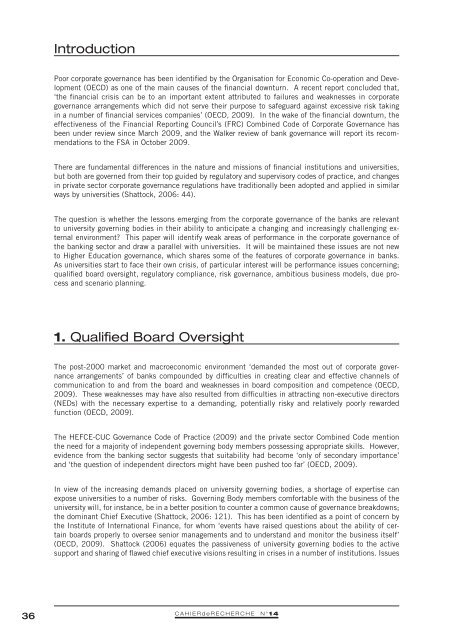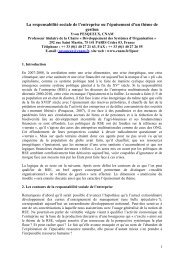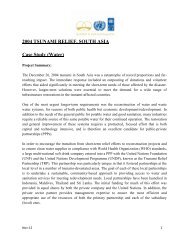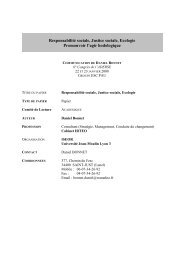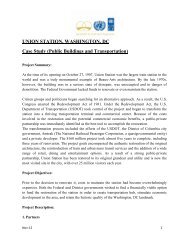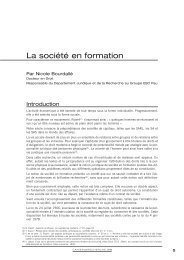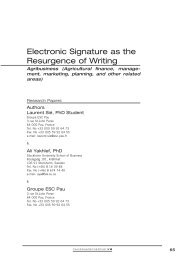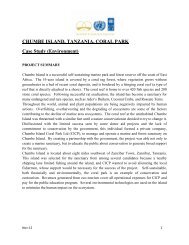Cahier de recherche N°14 - ESC Pau
Cahier de recherche N°14 - ESC Pau
Cahier de recherche N°14 - ESC Pau
You also want an ePaper? Increase the reach of your titles
YUMPU automatically turns print PDFs into web optimized ePapers that Google loves.
IntroductionPoor corporate governance has been i<strong>de</strong>ntified by the Organisation for Economic Co-operation and Development(OECD) as one of the main causes of the financial downturn. A recent report conclu<strong>de</strong>d that,‘the financial crisis can be to an important extent attributed to failures and weaknesses in corporategovernance arrangements which did not serve their purpose to safeguard against excessive risk takingin a number of financial services companies’ (OECD, 2009). In the wake of the financial downturn, theeffectiveness of the Financial Reporting Council’s (FRC) Combined Co<strong>de</strong> of Corporate Governance hasbeen un<strong>de</strong>r review since March 2009, and the Walker review of bank governance will report its recommendationsto the FSA in October 2009.There are fundamental differences in the nature and missions of financial institutions and universities,but both are governed from their top gui<strong>de</strong>d by regulatory and supervisory co<strong>de</strong>s of practice, and changesin private sector corporate governance regulations have traditionally been adopted and applied in similarways by universities (Shattock, 2006: 44).The question is whether the lessons emerging from the corporate governance of the banks are relevantto university governing bodies in their ability to anticipate a changing and increasingly challenging externalenvironment? This paper will i<strong>de</strong>ntify weak areas of performance in the corporate governance ofthe banking sector and draw a parallel with universities. It will be maintained these issues are not newto Higher Education governance, which shares some of the features of corporate governance in banks.As universities start to face their own crisis, of particular interest will be performance issues concerning;qualified board oversight, regulatory compliance, risk governance, ambitious business mo<strong>de</strong>ls, due processand scenario planning.1. Qualified Board OversightThe post-2000 market and macroeconomic environment ‘<strong>de</strong>man<strong>de</strong>d the most out of corporate governancearrangements’ of banks compoun<strong>de</strong>d by difficulties in creating clear and effective channels ofcommunication to and from the board and weaknesses in board composition and competence (OECD,2009). These weaknesses may have also resulted from difficulties in attracting non-executive directors(NEDs) with the necessary expertise to a <strong>de</strong>manding, potentially risky and relatively poorly rewar<strong>de</strong>dfunction (OECD, 2009).The HEFCE-CUC Governance Co<strong>de</strong> of Practice (2009) and the private sector Combined Co<strong>de</strong> mentionthe need for a majority of in<strong>de</strong>pen<strong>de</strong>nt governing body members possessing appropriate skills. However,evi<strong>de</strong>nce from the banking sector suggests that suitability had become ‘only of secondary importance’and ‘the question of in<strong>de</strong>pen<strong>de</strong>nt directors might have been pushed too far’ (OECD, 2009).In view of the increasing <strong>de</strong>mands placed on university governing bodies, a shortage of expertise canexpose universities to a number of risks. Governing Body members comfortable with the business of theuniversity will, for instance, be in a better position to counter a common cause of governance breakdowns;the dominant Chief Executive (Shattock, 2006: 121). This has been i<strong>de</strong>ntified as a point of concern bythe Institute of International Finance, for whom ‘events have raised questions about the ability of certainboards properly to oversee senior managements and to un<strong>de</strong>rstand and monitor the business itself’(OECD, 2009). Shattock (2006) equates the passiveness of university governing bodies to the activesupport and sharing of flawed chief executive visions resulting in crises in a number of institutions. Issues36CAHIER<strong>de</strong>RECHERCHE N°14


